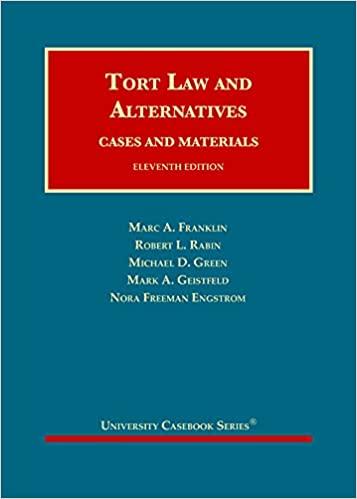Question
Q2. State A sues State B in the International Court of Justice (ICJ). The ICJ hands down a judgment that is adverse to State B.
Q2. State A sues State B in the International Court of Justice (ICJ). The ICJ hands down a judgment that is adverse to State B. State B refuses to comply with the judgment. What can State A do to get State B to comply?
Q6 Lemon Ltd is a company registered in the United Kingdom (UK) which produces computers and has a call centre registered in the State Republic of H to address complaints associated with its computer products. The standard terms attached to the computers specify that for any deficiencies in the product, the Courts of England would have exclusive jurisdiction, while the Courts in the State Republic of H would have exclusive jurisdiction over any complaints associated with after sales service. Ms Distressed buys a Lemon Ltd computer in London that has a problem after the warranty period has expired. The call centre provides her with instructions that lead to the computer ceasing to function completely. She sues Lemon Ltd, in a London Court, arguing that the State Republic of H has very low standards of consumer protection and the forum clause in the contract was "unfair." What should the London Court decide? Discuss.
Q8 State R decides to nationalise all property within its territory belonging to nationals of the United States (US). The US objects that this violates International Law, but State R goes ahead anyway. Afterward, R Bank, the national bank of State R, which has assumed ownership of all of the nationalised property, sells the expropriated goods of one Mr Ess to Tee Co, a firm in the US. Mr Ess brings suit in a US Court demanding that Tee Co pay him for goods it received from State R. R Bank intervenes and asks the Court to dismiss the suit, claiming that a decision by the US Court in favour of Mr Ess would iolate the ct of tate doctrine. The tate epartment has declined an in itation to sa what effect a decision would ha e on foreign polic is- -vis State R. Should the US Court dismiss the case? Explain.
Q9 In relation to the situation discussed in Question 6, assume that Ms Distressed does not succeed before the London Court and decides to sue Lemon Ltd's call centre in the Courts of the State Republic of H. Lemon Ltd raises the objection that the Courts in the State Republic of H are forum non conveniens for the present dispute. Lemon Ltd argues that the call entre representatives are trained in the UK and an assessment of the quality of the service will require evidence to be collected in the UK. Do you think Lemon Ltd will succeed? Discuss
Reading materials for Q2 : International Court of Justice (ICJ) l Established in 1945 by the Charter of the United Nations (UN) and functions according to the Statute of the Court of International Justice. l Principal judicial organ Principal judicial organ of the UN. l Has jurisdiction to hear: Disputes between States pursuant to its contentious jurisdiction. Cases from organs and specialised agencies of the UN pursuant to its advisory jurisdiction. l No power to hear cases involving individuals.
Reading materials for Q6 : Shell v R. W. Sturge, Ltd 1955 US Ct of Appeals l Plaintiff's were residents of Ohio US who invested in the Society of Lloyd's, and executed an agency agreement with R.W. Sturge Ltd to represent them with Lloyd's as their Member's Agent. l The plaintiffs brought a legal action under Ohio securities The plaintiffs brought a legal action under Ohio securities laws. l The investment contracts between the parties contained a forum selection clause giving exclusive jurisdiction to Courts in England. l Held: A forum selection clause in an international contract should be enforced unless: 1 Enforcement would be unreasonable and unjust; or 2 The clause was invalid for reasons of fraud or overreaching.
Reading materials for Q8 : Act of State doctrine l Doctrine that restrains domestic Courts from exercising jurisdiction over foreign States. l The act of a government within the boundaries of its own territory is not subject to scrutiny in a its own territory is not subject to scrutiny in a foreign Court. l A domestic Court will not hear a dispute based on such acts if to do so would interfere with the forum State's foreign policy. l Australia, the US and the UK implement this rule based on the doctrine of separation of powers.
Reading materials for Q9 : Forum non conveniens l Doctrine that a domestic Court will decline to hear a dispute when it can be better or more conveniently heard in a foreign Court. The basis of the doctrine is in the Common Law. l A basic four-part test is used to apply the forum non conveniens: If there is an alternative forum that is (1) available and (2) adequate; and If (3) private interest factors and (4) public interest factors point toward the alternative forum and away from domestic Courts.
Step by Step Solution
There are 3 Steps involved in it
Step: 1

Get Instant Access to Expert-Tailored Solutions
See step-by-step solutions with expert insights and AI powered tools for academic success
Step: 2

Step: 3

Ace Your Homework with AI
Get the answers you need in no time with our AI-driven, step-by-step assistance
Get Started


